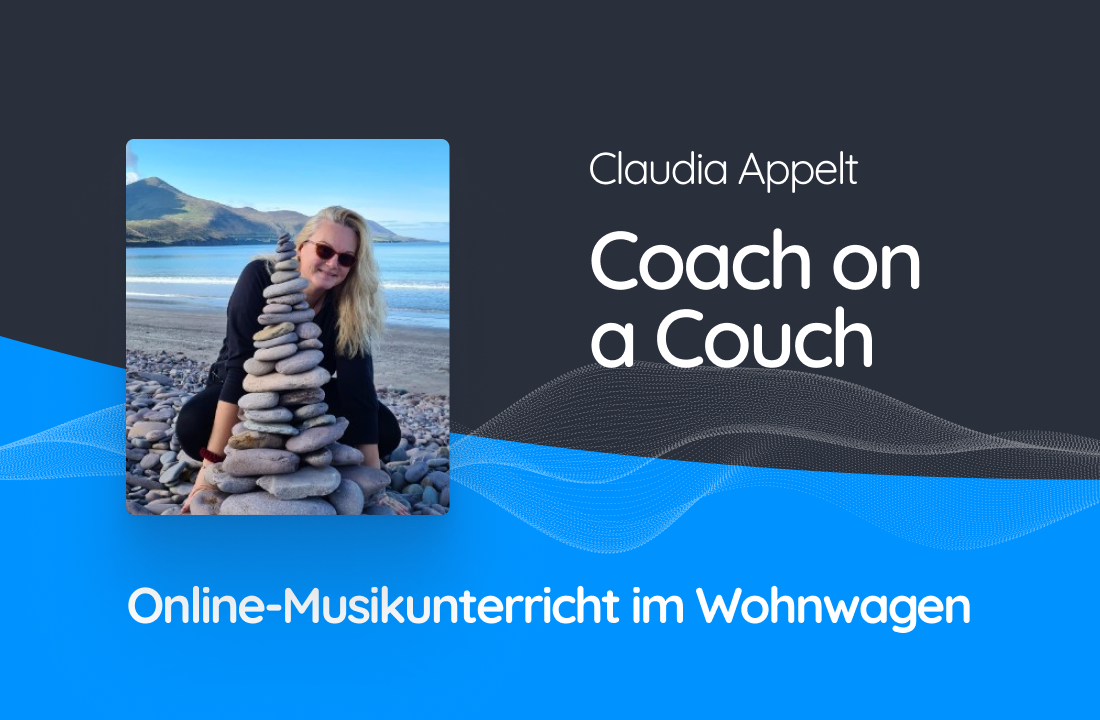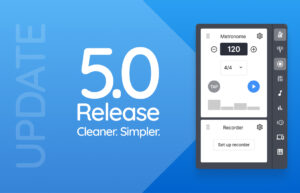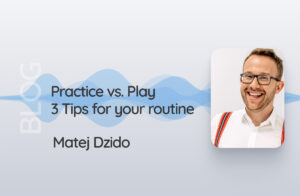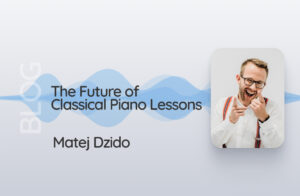In this episode, our guest was Claudia Appelt, with a degree in instrumental pedagogy. She has taught recorder and transverse flute at music schools, and since 2010 she has been in charge of classes and various transverse flute and orchestra groups at an elementary school. Currently, Claudia is traveling across Europe in a caravan with her family. She shares how she teaches from there and her experiences in the recent interview.
Listen to the podcast ad anchor or any podcast provider of your choice.
Where are you currently traveling, and how did it all come up?
Claudia: “Currently, I am in Ireland. We started at the end of July last year with the plan to spend a year traveling Europe with our family in a caravan. Our two children, two girls (12 and 15), are also with us.
But this year has become more because we have tasted a little blood. My husband, who has been working at home since the pandemic, can continue to do so. I am still on leave for another three years.
I never planned to teach music online here.
It came up at campsites because many families are on the road for a year or more. Many have that as a way of life.
What I find interesting is that most tell the same story. The kids can do anything on the road. So it goes with school and the most diverse educational experiences. You can imagine that when you get to know and visit many countries, cities, and people. The only tricky thing is regular hobbies.
At the campsites, I first did trial lessons. Some of them moved on but wanted to stay. They then got to know someone again and told me about it. So now I have a handful of students. At the moment, I’m happy because we have to organize ourselves well here.
How can one imagine life with you in a caravan?
Claudia: “A trailer like this has only one room, with everything you have at home. It’s just smaller. Since my husband is also still working and my daughters are doing online school, at the moment, I teach two days a week in the mornings.
The international online school is in the afternoon. The students consist of German children, but they are spread all over the world. So, therefore, you have to find a time that works with that. That means the whole thing takes place between 1:00 and 6:00 p.m. I then start at 9:00 in the morning and finish at 11:00.
My husband works in the car most of the time. We still have a van attached to the front of the trailer. It was also already planned that he works through. The van has a table in the back. He has a sort of office on wheels, complete with printer and everything you need.”
Who are your students?
Claudia: “They are almost all children on the road, go to school in the afternoon, or are free learners. I didn’t know anything like that before. I wouldn’t have thought the need was there, especially in this quantity. There are often siblings in the students’ room, often babies. That’s because my target group at the moment is traveling families. Therefore, they are similarly limited in terms of space while on the road. I then experience the noise nuisance the other way around. But addressing this is not a problem at all. Most of the time, they notice it on their own.
How well do online classes work? What do you have to look out for in your locations?
Claudia: “We don’t always stand on campsites, but occasionally free. My husband knew from the beginning that he needed Wi-Fi every day. That’s why we bought a mobile router.
In every country we go to, we buy a phone card. It connects to the country’s networks. The network coverage is much better there [than in Germany]. So this mobile router works quite well. At the moment, however, we are online via the Wi-Fi from the campsite. That is sometimes possible.
When you teach music online, you need a stable Internet connection. It rarely happens that there are problems. The week before last I had the situation that the campsite was under construction. There was a lot of construction noise. Online teaching would not have worked if there had been no vacations.
When I teach, I am alone in the trailer. We make sure of that. For example, a child may say he doesn’t want to get up. Then it has to stay quietly in bed. The space behind the camera is a small separate room with a bunk bed from the children. If they remain there quietly, that also works, and it’s not in the camera’s picture. Since I also work with headphones, it’s not a big noise nuisance to the outside.”
What problems has doozzoo solved for you in teaching music online?
Claudia: “Before I found doozzoo, I had been working over Skype without a headset. I got a little thrown in there at the time during the lockdown. Since I have been using a headset, my students are much more concentrated. In addition, I don’t notice so much from the outside anymore. I recommend that to the kids as well.
I only have a few kids in online classes overall. Most of them are usually of elementary school age. There must be as little external distraction as possible. The disadvantage of online lessons with toddlers and beginners is that you can’t touch them.
Latency issues and the inability to support rhythms were a problem. You can only work with playbacks online if you want to help. If you don’t do that with doozzoo, you need to play them from the outside. So the kids couldn’t do lessons on their own. The parents would have to put an additional box next to it and play music from the cell phone.
That’s silly because there’s always trouble. If the parents sit next to it, that’s not nice to me either. Of course, it’s a different relationship level face to face, without mom sitting there. With doozzoo, I can do the playback, metronome, etc. The child focuses on me. It works very well.”
Did you have to make didactic changes, and if so, which ones?
Claudia: “I don’t have experience teaching absolute beginners online yet. Especially the handling of the instrument, the embouchure or finger position is difficult to show without touching. That also goes through the first years. A lot of things have to go over the head.
I work a lot with visualizations. In the local music lessons, it would have been with a blackboard or slips of paper on the floor. For learning to read music, that’s good. The kids can push things around themselves or write something in themselves.
For me, learning music is a lot about the body. Compared to the lessons before, it’s different. A lot of things change. Once the playing together falls away. Then there’s the rhythmic support, which I can adapt, and bodywork. That would be breathing exercises, lying on the floor, or even a little yoga, to experience the body.
You have to do all these things differently. What works well – especially in beginning classes – is body percussion training. You can do that visibly, too.”
What does your setup look like, and how has it changed?
Claudia: “I didn’t change much. The headphones have already made an enormous difference. I always think about getting a second camera. I could show my approach here or visualize my fingers there. It would be nice to have two views.
I’ll have to see how I stow it all away. I can find room for it under my socks if I’m honest. I store all my flutes, music stands, and everything else inside the bench I am sitting on.
What are your plans for the future?
Claudia: “I expect to keep the online music lessons with the kids when I get back [home]. It will be even better because I’ll have much more material, like sheet music, available. I am still determining whether I’ll still be on the road for the next three years. I took a leave of absence, but I can still cut that at any time. It’s the maximum for now. When I come back is my decision. There is still a need for teachers everywhere.
The world is big, and personal life situations depend heavily on work in our system. So if you can make yourself independent, that’s a great thing. Both for students and teachers. I’m in the lucky position that I’m not financially dependent [on teaching] right now.”











